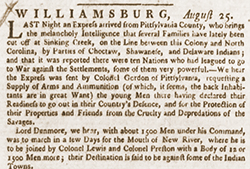 |
|||||||
|
|||||||
Sinking Creek Settlement |
|||||||
|
Sinking Creek is a tributary of the Watauga River. The Sinking Creek Baptist Church was organized in 1772. The creek is in Johnson City, Tennessee. Elder Sparks in Racoon John Smith says that it was an "out-and-out Calvanistic" church." December 31, 1774, John Carmack had 470 acres survyed on Sinking Creek and
In 1776, the church was disbanded because problems with the indigenous people. In 1777-1778 it was reorganized by Talbot, Mulkey, and Joshua Kelly. In 1778, Francis Hughes was granted 100 acres on Sinking Creek. In 1782 the Philip Ausmus family settled along the middle fork of Sinking Creek, one mile southwest of present day Johnson City near the home of John Sevier. Randolph Crecelias (b. 1728) came at the same time and settled adjacent to Philip Ausmus' land along Little Cherokee and Sinking Creeks. John Hammer came to Washington County in the early 1780's along with his brother, Baltis, the Bogart family and the Range family. They settled on Knob Creek and were early members of Sinking Creek Baptist Church. Samuel Tipton joined the Sinking Creek Baptist Church about 1783. In 1783 a new log church was built. In 1784 John Ford, William Haile, Lloyd Ford and Mordecai Ford were granted land on Sinking Creek. Between 1784 and 1787 John Reneau settled on Sinking Creek. A register of members of Sinking Creek Church, Book I to 1791 lists church members Garrett Reasoner, Keziah Reasoner, Charles Reno/Reneau, Elizabeth Tipton, Samuel Tipton, Catherine Reno/Reneau, William Reno/Reneau, and John Reno/Reneau. William Reno/Reneau was listed as a "clerk in behalf of the church" in a document dated July 5, 1785. Joseph Crouch received a land grant in 1790, Sinking Creek, Washington County. In 1790, Charles Reneau was "defellowshipped" by the Sinking Creek Baptist Church for "arguing and leaving the church in a rude and angry manner." He was later restored in good standing. In the early 1790s Jesse Hunt bought several tracts on Sinking Creek. In 1792, Frederick Emmert bought 200 acres on Sinking Creek. In 1794 William Jackson bought land on Sinking Creek from Anthony Duncan. On February 13, 1796, Sinking Creek Church found Sarah Reneau guilty of fornication. In 1806 Thomas Barron bought 205 acres on Sinking Creek. In 1812 Joshua Boring bought 74 ¾ acres on Sinking Creek in Washington County from Nathaniel Taylor next to Caleb Odell. 18 Oct 1819, Joshua Boring sold 78 acres of land in Carter County, Tennessee on Sinking Creek to John McAfee. About 1824, several members were excommunicated from the Sinking Creek Baptist Church. The church split over who was to baptize Fanny Renfro. The excommunicated included Edward Hendry, Richard Carr, Joseph Renfro, David Pugh, Molly Hendrix and Eli McNabb. They went to Boones Creek Baptist Church. Leonard Hart (1758-1852) was buried in the Sinking Creek Baptist Cemetery. |
|
|||||
|
|||||||
|
|||||||
|
©Roberta Tuller 2025
|
|||||||

